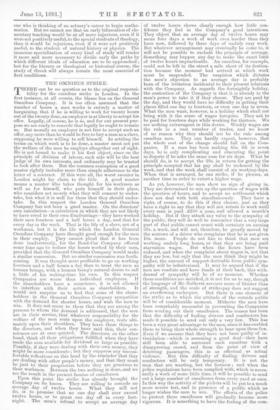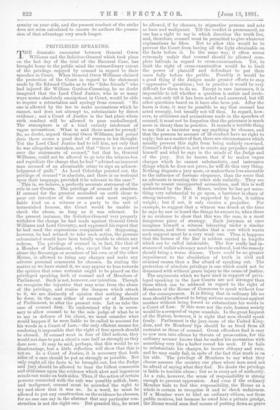THE OMNIBUS STRIKE. T HERE can be no question as to
the original responsi- bility for the omnibus strike in London. In the first instance, at all events, the blame lies on the General Omnibus Company. It is too often assumed that the number of hours a man works is entirely a matter of bargaining, that if he is willing to work for twenty hours out of the twenty-four, an employer is at liberty to accept his offer. Legally, of course, he is so, and for our present pur- pose we are ready to concede' that legally he ought to remain so. But morally an employer is not free to accept such an offer, any more than he would be free to buy a man as a slave, supposing he were willing to sell himself. In settling the terms on which work is to be done, a master must not put the welfare of the men he employs altogether out of sight. He is not bound to make it his first object, since on the principle of division of labour, each side will be the best judge of its own interests, and ordinarily may be trusted to look after them. But the common conception of a good master rightly includes more than simple adherence to the letter of a contract. If this were all, the worst sweater in London might lay claim to the title. A good master means a master Who takes thought for his workmen as well as for himself, who puts himself in their place, who considers not merely what they will consent to under- take, but what it is well for them that they should under- take. In this respect the London General Omnibus Company has not been a good master. On the directors' own calculation—a calculation in which they are not likely to have erred to their own disadvantage—they have worked their men fourteen and a half hours a day, and that for every day in the week. That is the life of a slave, not of a workman, but it is the life which the London General Omnibus Company have thought good enough for the men in their employ. They cannot plead that it has been done inadvertently, for the Road-Car Company offered some time ago to reduce the hours worked by their men, provided that the General Omnibus Company would make a similar concession. But no similar concession was forth- coming. It was thought more profitable to go on working fourteen and a half hours a day than to treat the men as human beings, with a human being's natural desire to call a little of his waking-time his own. In this respect Companies are worse than individual employers. If the shareholders have a conscience, it is not allowed to interfere with their action as shareholders. It would not surprise us to find that some of the share- holders in the General Omnibus Company sympathise with the demand for shorter hours, and wish the men to win. It does not occur to them that they are among the persons to whom the demand is addressed, that the men are in their service, that whatever responsibility for the welfare of the men rests upon the employer, rests ulti- mately upon their shoulders. They leave these things to the directors, and when they have said this, their con- sciences are at once quieted. The directors, on the other hand, think all their obligations fulfilled when they have made the sum available for dividend as large as possible. Possibly, if they were dealing with their own money, they might be more considerate ; but they suppress any uncom- fortable reflections on this head by the remindeithat they are dealing with other people's money, and that they must -be just to their proprietors before they are generous to their workmen. Between the two nothing is done, and we see the result in the present famine of omnibuses. Upon this point the strike has already brought the Company on its knees. They are willing to concede an average day of twelve hours. What they will not do, is to promise that no one day shall ever exceed twelve hours, or to grant one day off in every fort- night. The men's refusal to accept an average day of twelve hours shows clearly enough how little con- fidence they feel in the Company's good intentions. They object that an average day of twelve hours may mean four days a week of work even harder than they have now, followed by three days of unduly easy work. But whatever arrangement may eventually be come to, it -will not be possible to exclude the principle of average. Something may happen any day to make the exact limit of twelve hours impracticable. An omnibus, for example, could not be left in the street a mile short of its destina- tion because the moment had arrived at which work must be suspended. The suspicion which dictates the men's objection to an average day is probably born of the irritation incidental to their present relations with the Company. As regards the fortnightly holiday, the contention of the Company is that it is already in the men's power to take it if they choose. They are paid. by the day, and they would have no difficulty in getting their places filled one day in fourteen, or even one day in seven. What the men want, however, is a holiday which shall not bring with it the sense of wages foregone. They ask to be paid for fourteen days while working for thirteen. We see nothing extravagant in this desire. Weekly wages are the rule in a vast number of trades, 'and we know of no reason why they should not be the rule among omnibus men. They can hardly expect, however, that the whole cost of the change should fall on the Com- panies. If a man has been making 45s. 6d. in seven days, he is only complicating and obscuring the point in dispute if he asks the same sum for six days. What he should do, is to accept the 39s. in return for getting the principle accepted that his pay shall be reckoned by the week, and that the week shall consist of six working-days. When that is arranged, he can strike, if he pleases, at another time in order to extort a higher wage.
As yet, however, the men show no sign of giving in. They are determined to mix up the question of wages with the question of hours, and to accept no settlement which does not deal with both simultaneously. They have a right, of course, to do this if they choose, just as they have a right to say that they will not return to work until every man is paid. £250 a year, and allowed a month's holiday. But if they attach any value to the sympathy of the public, they will do well to remember that a very large part of that public cannot count with certainty on earning 39s. a week, and will not, therefore, be greatly moved by the sorrows of a driver who complains that he is not given 10s. more. People do not like to think that men are working unduly long hours, or that they are being paid starvation wages. But when the hours have been reduced, and when the complaint about wages is, not that they are low, but orgy that the men think they might be higher, the amount of support derivable from public sym- pathy will be infinitesimal. It may be argued that if the men are resolute and have funds at their back, this with- drawal of sympathy will be of no moment. Whether these conditions are satisfied, it is not for us to say, though the language of Mr. Sutherst savours more of bluster than of strength, and the scale of strike-pay does not suggest an overflowing exchequer. But there is one element of the strike as to which the attitude of the outside public will be of considerable moment. Hitherto the men have been remarkably successful in preventing the Companies from sending out their omnibuses. The reason has been that the difficulty of finding drivers and conductors has made it possible to send out only a very few. This has been a very great advantage to the men, since it has enabled them to bring their whole strength to bear upon these few. Even if we assume that they have not been guilty of in- timidation—which is assuming a good deal—they have still been able to surround each omnibus with a disapproving crowd, and from the point of view of deterring passengers, this is as effectual as actual violence. But this difficulty of finding drivers and conductors will be only temporary. It is not the men that are wanting, but the licences ; and when the police regulations have been complied with, which is neces- sarily a work of some little time, it will be possible to send out a large number of omnibuses from every yard at once. In this way the v or the pickets will be put to a much more severe test, and in presence of a public which no longer wishes the men to win. The efforts of the police to protect these omnibuses will gradually become more vigorous. It is something to have the feeling of the corn- munity on your side, and the present conduct of the strike does not seem calculated to ensure its authors the posses- sion of that advantage very much longer.



































 Previous page
Previous page